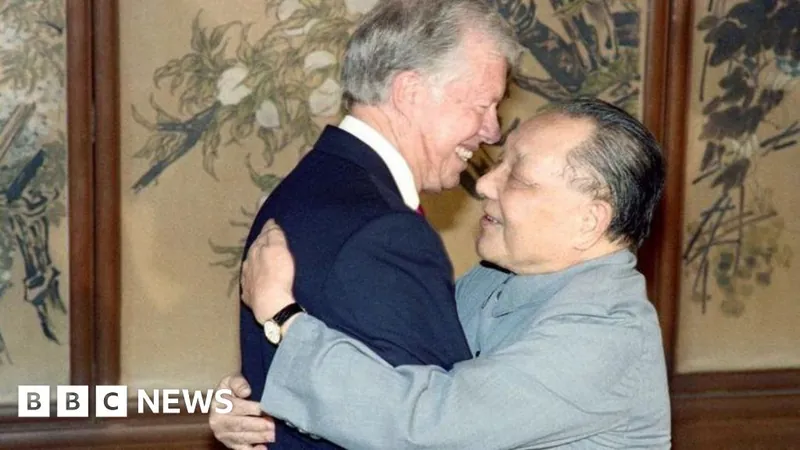
Jimmy Carter: The Unlikely Architect of U.S.-China Relations
2024-12-31
Author: Jacques
How a Peanut Farmer's Son Helped Change the Course of History
In January 1979, the world witnessed a pivotal moment in global politics as then-U.S. President Jimmy Carter welcomed Chinese leader Deng Xiaoping to Washington. This historic meeting marked the beginning of formal diplomatic relations between the United States and Communist China, a partnership that would dramatically reshape the geopolitical landscape.
Deng Xiaoping, the first leader of Communist China to officially visit the U.S., arrived amidst a backdrop of significant snowfall—a symbol, perhaps, of the chilly relations that had previously existed between the two nations. His visit symbolized a thawing of a relationship that had been frozen since the Chinese Communist Party took power in 1949.
Carter’s decision to establish formal ties with China is often regarded as one of the defining moments of his presidency, which was marked by numerous challenges, including the Iranian hostage crisis. Born on October 1—a date shared with the founding of the People’s Republic of China—Carter believed it was destiny that connected him to China, fostering a relationship that would extend well beyond his time in office.
A Historic Realignment of Power
Carter’s efforts towards creating diplomatic relations were the culmination of years of groundwork laid by previous administrations, particularly Richard Nixon's historic visit to China in 1972. By the late 1970s, the global dynamics were shifting. The tension between the U.S. and the Soviet Union provided an opportunity for both Washington and Beijing to cultivate a stronger partnership against their common rival.
On December 15, 1978, the two nations announced their decision to officially recognize each other and establish diplomatic relations effective January 1, 1979. This momentous declaration shocked many and was celebrated in Beijing, but it also left Taiwan—once a U.S. ally—frustrated, as the Carter administration shifted recognition from Taiwan to the People's Republic of China, adhering to the "One China" policy, which still governs U.S.-China relations to this day.
Carter's pivot raised questions within Congress about U.S. commitments to traditional allies in the region, leading to legislation ensuring continued arms sales to Taiwan, thereby creating a perpetual tension in U.S. foreign policy.
Building Bridges: Carter and Deng’s Unconventional Friendship
Central to this thaw in relations was the unique personal rapport between Carter and Deng. Their interactions displayed a mutual respect that was rare at the time. According to scholars, their personalities meshed well; both leaders shared a straightforward approach to diplomacy that allowed them to navigate the complexities of international relations effectively.
Deng's visit included a tour across several American states, where he embraced local culture, even donning a cowboy hat at a rodeo. This image of a world leader engaging with American life helped humanize China to the American public and foster goodwill between the two nations.
Beyond the initial recognition of diplomatic ties, Carter's administration also granted China "most favored nation" status in trade, significantly boosting China's economic growth and opening avenues for bilateral trade, which doubled within a year. This set in motion a series of economic transformations that would ultimately lead to China becoming a global economic powerhouse.
Lasting Impact and Contemporary Challenges
Even after leaving the presidency, Carter maintained a strong connection with China. His humanitarian efforts included observing local elections in China and aiding earthquake relief efforts. He became a beloved figure in the country, appreciated for his authenticity and commitment to mutual understanding.
However, as U.S.-China relations evolved, so too did Carter's standing—particularly as tensions rose under President Xi Jinping’s administration. There were reports of diminished public support for Carter during his later visits, underscoring the complicated nature of U.S.-China ties today.
In his later years, Carter expressed concerns over the growing mistrust between the two nations, warning of a potential "modern Cold War." As the 40th anniversary of normalized relations passed, he reiterated that U.S. and China must work collaboratively for global peace—an echo of the spirit he and Deng embodied during their initial negotiations.
Conclusion: A Legacy of Engagement
Carter’s monumental choice to engage with Communist China not only transformed international relations but also improved the lives of millions of Chinese citizens, ultimately demonstrating that sometimes, it takes unexpected friendships and a willingness to challenge the status quo to create lasting change. As Carter himself noted, the principles of peace and cooperation remain relevant today, underscoring the critical need for leaders to prioritize collaboration over division in an increasingly complex world.



 Brasil (PT)
Brasil (PT)
 Canada (EN)
Canada (EN)
 Chile (ES)
Chile (ES)
 Česko (CS)
Česko (CS)
 대한민국 (KO)
대한민국 (KO)
 España (ES)
España (ES)
 France (FR)
France (FR)
 Hong Kong (EN)
Hong Kong (EN)
 Italia (IT)
Italia (IT)
 日本 (JA)
日本 (JA)
 Magyarország (HU)
Magyarország (HU)
 Norge (NO)
Norge (NO)
 Polska (PL)
Polska (PL)
 Schweiz (DE)
Schweiz (DE)
 Singapore (EN)
Singapore (EN)
 Sverige (SV)
Sverige (SV)
 Suomi (FI)
Suomi (FI)
 Türkiye (TR)
Türkiye (TR)
 الإمارات العربية المتحدة (AR)
الإمارات العربية المتحدة (AR)